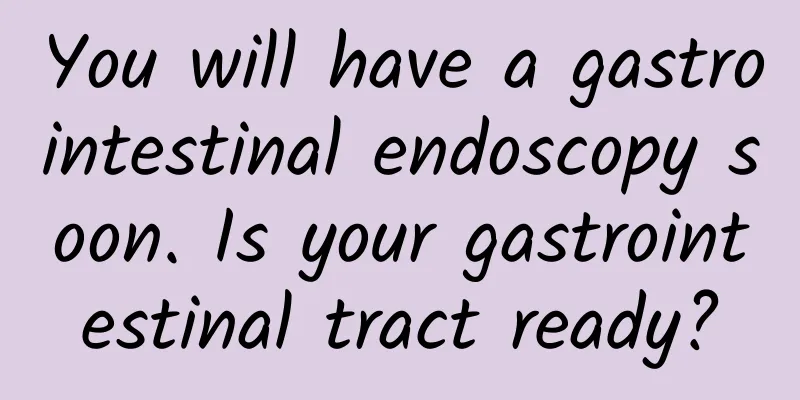You will have a gastrointestinal endoscopy soon. Is your gastrointestinal tract ready?

|
You will have a gastrointestinal endoscopy soon. Is your gastrointestinal tract ready? Yan Chunmei, General Hospital of North China Petroleum Administration Bureau Gastroenteroscopy is an important means of diagnosing digestive tract diseases. If fasting preparation is not sufficient, it may lead to unclear vision during the examination and affect the accuracy of diagnosis. 1. Stop taking medication: Before the gastrointestinal endoscopy, patients need to stop taking drugs that may affect the test results or increase the risk of the test, especially anticoagulants that may cause bleeding during the test. The time of discontinuation depends on the type of drug and half-life, and generally requires 5 to 7 days of discontinuation. Please consult a specialist to determine whether the drug can be discontinued. If the drug is not discontinued, only the test can be performed, but no biopsy can be performed. If the patient is taking antihypertensive drugs, they still need to take them on time on the morning of the examination and drink a small amount of water to keep blood pressure stable. 2. Quit smoking and drinking: Do not smoke or drink before the examination to prevent tobacco and ethanol from irritating the gastrointestinal tract and affecting the accuracy of the examination results. 3. Diet adjustment: The day before the examination, it is recommended to eat light, residue-free liquid or semi-liquid food, such as porridge, noodles, clear soup, etc., which is conducive to food digestion and facilitates the examination. Avoid eating high-fiber, greasy, spicy and other irritating foods to avoid affecting the effect of intestinal preparation. 4. Fasting preparation: Gastroscopy requires fasting for more than 8 hours to ensure that there is no food residue in the stomach to facilitate doctor's observation. The fasting requirements for colonoscopy are more stringent. Patients need to eat a low-residue diet 1 to 2 days before the examination, finish dinner before 6 pm the night before the examination, and take laxatives for intestinal cleansing. Commonly used laxatives include Heshuang (polyethylene glycol electrolytes), magnesium sulfate, etc. Start drinking Heshuang (pineapple flavor, colorless and fragrant, some people find it sweet. 1 bag is diluted with 1000ml of water and finished within one hour) or magnesium sulfate (bitter, poor taste, 10g is diluted with 200ml of water and taken, then drink 1000ml of warm water or electrolyte drink, and drink it within one hour). Take laxatives again at 4 or 5 am for the examination. Drink a little white porridge before 8 am on the day of the afternoon examination, and drink two packs of Heshuang (2000ml diluted with water) from 9 to 11 am. Do not drink for at least 4 hours before the colonoscopy until the end of the examination. Remember to drink the defoaming agent after taking the last laxative: dimethicone emulsion (defoaming agent: as the name suggests, it is to eliminate bubbles in the stomach. After drinking and refreshing, bubbles will appear in the stomach. The dense bubbles will be discharged along with the anus and stool. The defoaming agent is taken last to eliminate bubbles and clear a clean and tidy space for the intestines, so that the doctor can put the endoscope in the body to explore the way in the afternoon. However, some people have poor intestinal sensitivity after taking these drugs and do not have a bowel movement. In this case, they may still need to go to the hospital to have a doctor perform an enema to completely eliminate the intestinal contents. After taking laxatives, you will have multiple bowel movements, and finally excrete nearly colorless or light yellow transparent watery stools, which proves that the intestinal preparation is qualified and colonoscopy can be performed. |
>>: Don't panic if you have abdominal pain and bloating after a colonoscopy!
Recommend
Can I brisk walk during my period? Experts tell you the right way
Women need to pay attention to many things during...
Is green vaginal discharge a sign of pregnancy?
Women will have some leucorrhea more or less. The...
Why is a woman's right hand swollen?
In daily life, peeling of women's hands is mo...
No Down syndrome screening is required for the second child
When pregnant with your first child, you will bas...
What happens if your period is delayed for ten days and has not come yet?
Normally our menstrual period will be delayed by ...
Counterpoint: India's smartphone sales to grow 3% year-on-year in the third quarter of 2024
According to the latest research from Counterpoin...
Short menstrual intervals are a sign of menopause
Women's menopause affects their personal heal...
Why is my period coming back?
Menstruation is a physiological phenomenon that o...
Why does intercourse hurt?
Sometimes there will be some unpleasant episodes ...
The country is calling on you to lose weight! Post-00s already have abdominal muscles, are you still waiting for the ninth cup of milk tea?
(The full text is about 900 words and the reading...
What are the benefits of eating lemons? Why do we add lemons to oysters?
Lemon water is rich in vitamins and has beauty ef...
Why do Olympic champions like to bite their gold medals? It turns out that he is the originator. Some even broke their teeth...
Expert of this article: Li Lihang, PhD candidate ...
What can I eat to help me sleep? Four foods recommended for calming the nerves and helping you sleep
We spend one-third of our day sleeping. Good slee...
Causes of recurrent fever due to mastitis
After the birth of the newborn, mothers let the b...
What is the reason for vaginal bleeding after intercourse?
When passion arises, men and women often experien...









